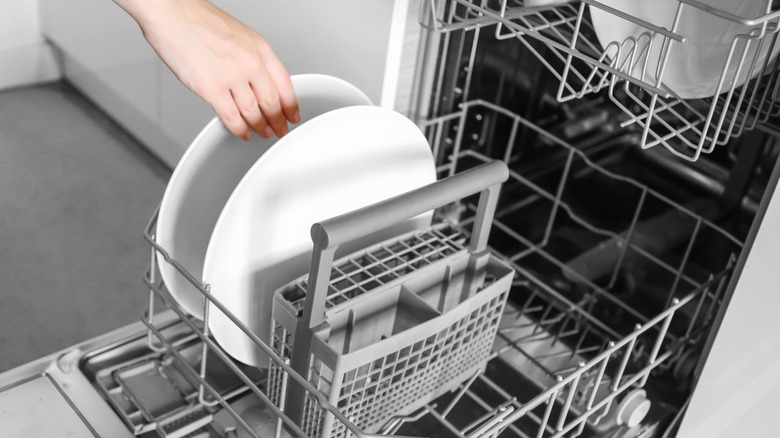What Happens If You Run A Dishwasher That Isn't Full?
Of the 68% of Americans who own a dishwasher, about 50% of them use it a few times a week, meaning millions of people are actively using this appliance, per Reviewed. Many people use a dishwasher to help get their plates sparkling clean alongside hand washing, a go-to for many individuals.
However, while using a dishwasher is incredibly common, there are many mistakes people make when using them. For example, some tend to put the wrong items in or stack things the wrong way, while others load and run their dishwasher half full on a regular basis. Although this seems like a quick and easy way to wash your dishware, it could force you to purchase a new appliance sooner rather than later and increase your utility bills. But why is this the case? Below, we'll dive into the deep depths of the dishwasher universe so that you can avoid disaster.
You will have to buy a new dishwasher sooner
Owning a dishwasher is great. You just pop your dishes inside, and you're ready to go. While it's easy to just toss in what you want and press start, not entirely filling your dishwasher could spell disaster. But why? Well, as it turns out, if you run a dishwasher without utilizing all the space inside, you could end up having to purchase a new dishwasher sooner versus if you run it at full capacity every time. Not only is this bad news for your dishwasher, but it's also bad news for your pockets. After all, you don't want to shell out unnecessary cash on a new dishwasher if you don't have to.
"Waiting for fuller loads can reduce the number of cycles that run on your dishwasher, which optimizes water usage and likely leads to a longer overall lifespan," Mark Horton, brand manager at Maytag, explained to Real Simple. So, it would be best to be patient and only turn your appliance on when it's completely full. Both your dishwasher and your wallet will thank you later. Of course, this is a very easy mistake to make — one that many of us don't think about. However, making this simple switch should help you in the long run. Of course, you should always ensure that your dishwasher is clean too. This way, it can run as efficiently as possible.
Your bills could skyrocket
Alongside having to fork out a hefty sum of cash for a new dishwasher, your electric and water bills could also skyrocket if you frequently run a dishwasher that isn't full. Repeating this mistake could cost you a considerable amount as your bills accumulate. Instead, make sure that you fill all the slots available. However, you should also ensure you don't overfill your dishwasher, which could force you to run it again.
"Using a modern dishwasher on a full load is actually more water efficient than washing your dishes by hand, meaning it's a win-win on saving you time and money," large appliance expert at AO, Sophie Beckett-Smith, told Homes and Gardens. So, getting into good habits with your dishwasher is undoubtedly the way to go. Likewise, if you're ever on the hunt for a new dishwasher, you can also check its energy rating. Using a top-rated appliance may help you reduce your carbon footprint and utility bills.


